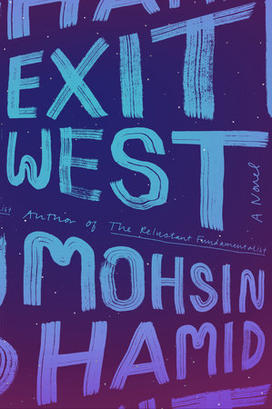Mohsin Hamid ’93’s Exit West Conjures the Plight of Modern Refugees

The book: Exit West (Riverhead) tells an allegorical tale about refugees through the story of a young couple in an unnamed city on the verge of civil war. Their relationship accelerates as the conflict grows increasingly violent, and soon Nadia and Saeed begin to hear rumors whispered about doors that can take them away from their homeland — for a price. Once they leave the city, the pair finds themselves in an alien world, clinging to each other as they try to hold onto their identities and history.
The author: Mohsin Hamid ’93 is a British-Pakistani novelist whose previous works include Moth Smoke (Farrar, Straus and Giroux), The Reluctant Fundamentalist (Harvest), and How to Get Filthy Rich in Rising Asia (Riverhead). His novels have become international bestsellers, been shortlisted for the Man Booker Prize, and translated into more than 30 languages. At Princeton, Hamid studied creative writing under Joyce Carol Oates and Toni Morrison.
Opening lines: “In a city swollen by refugees but still mostly at peace, or at least not yet openly at war, a young man met a young woman in a classroom and did not speak to her. For many days. His name was Saeed and her name was Nadia and he had a beard, not a full beard, more a studiously maintained stubble, and she was always clad from the tips of her toes to the bottom of her jugular notch in a flowing black robe. Back then people continued to enjoy the luxury of wearing more or less what they wanted to wear, clothing and hair wise, within certain bounds of course, and so these choices meant something.
It might seem odd that in cities teetering at the edge of the abyss young people still go to class—in this case an evening class on corporate identity and product branding—but that is the way of things, with cities as with life, for one moment we are pottering about our errands as usual and the next we are dying, and our eternally impending ending does not put a stop to our transient beginnings and middles until the instant when it does.
Saeed noticed that Nadia had a beauty mark on her neck, a tawny oval that sometimes, rarely but not never, moved with her pulse.
Not long after noticing this, Saeed spoke to Nadia for the first time. Their city had yet to experience any major fighting, just some shootings and the odd car bombing, felt in one’s chest cavity as a subsonic vibration like those emitted by large loudspeakers at music concerts, and Saeed and Nadia had packed up their books and were leaving class.”
Reviews: Kirkus Reviews said, “One of the most bittersweet love stories in modern memory and a book to savor even while despairing of its truths.” Booklist called it, “Spellbinding.”












No responses yet